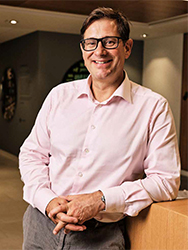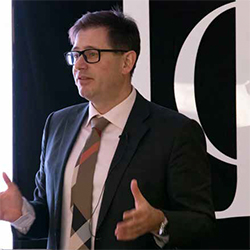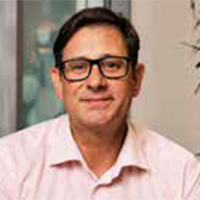 As a Partner responsible for both Deloitte’s UK offshore offices and parts of its UK financial services audit practice, John Clacy has a front row seat to the symbiotic relationship between the City of London and the Channel Islands. He shares his view on how the two jurisdictions can continue to grow together – and the challenges in the road ahead
As a Partner responsible for both Deloitte’s UK offshore offices and parts of its UK financial services audit practice, John Clacy has a front row seat to the symbiotic relationship between the City of London and the Channel Islands. He shares his view on how the two jurisdictions can continue to grow together – and the challenges in the road ahead
Tell us about your background – where you were born, grew up and studied...
I was originally born in Scotland but my parents moved to Guernsey when I was just two years old, so in effect Guernsey has always been my home. So I grew up in Guernsey and then I went to Sussex University to study experimental psychology, of all things. While I found that incredibly interesting, my father had always been a bit of an entrepreneur, and so I really wanted to go into business.
And what I realised pretty quickly was that if I became an accountant, that would give me the insights and background I needed to go pretty much wherever I wanted within business.
Tell us about your career trajectory – you’ve been with Deloitte for nearly 25 years, so talk us through what first attracted you to the firm and your rise to your current role…
What attracted me to Deloitte in the first instance was that while it was a well-established business in the islands, it was also part of a bigger UK business, and I realised that would give me lots of opportunities to work on different types of projects and to spend some of my time working in the UK while getting my qualification in the island. That really appealed to me.
I’m now Head of UK Financial Services Portfolio Audit, which includes overseeing Deloitte’s Channel Islands, Isle of Man and Gibraltar audit practices, as well other parts of the firm’s UK financial services audit practice, such as investment funds and pensions audits.
What is it that excites you about working in one of the Big Four firms and about the accountancy/consultancy sector – and what has kept you with the business for such a long time?
It’s absolutely true that working for an organisation as large as Deloitte had great appeal for me in the sense that I knew that I would get a lot of variety and I would work with many different businesses along the way. The challenges are always changing and I’ve never had a boring day at Deloitte.
And on top of that I get a real buzz from the fact that we bring in really different people – lots of people in the early stages of their careers – and we help them develop and grow with the organisation. That’s also a big part of the appeal and the reason I have stayed for so long.
It provides me with great variety but it is also very inspiring to watch how we are developing those people, and of course how they work with our clients.
Tell us about Deloitte’s presence in the Channel Islands and how that has evolved over the past quarter of a century. How has the business grown here and how does it fit with the UK business and the wider organisation?
The business has grown significantly in the Channel Islands over the past 25 years, and in the 1990s it became part of Deloitte UK – one of the country’s leading professional services firms.
I think that’s really valuable, in the sense that we are able to tap into the breadth and experience of our UK business, while retaining our local knowledge and relationships here in the Channel Islands.
In my role I oversee Deloitte in Guernsey, Jersey, the Isle of Man and Gibraltar.
Last year, Deloitte’s offices in the Channel Islands, Gibraltar and the Isle of Man joined forces to create a single audit and assurance offering across the four offshore jurisdictions. This enabled Deloitte to bring a broader suite of expertise to each location.
It really pleases me to see how the local teams are developing and growing, and delivering high-quality services in those jurisdictions – all the while still having the ability to tap into the UK business when needed.
The way that happens on a day-to-day basis is that the local teams of course have relationships in the local market with an understanding of the unique factors, but they also regularly bring experts across from the UK if they feel like it adds value.
In terms of how transformational the change in the business has been in the past 25 years that I have been here, when I first sat down at my desk it was at Touche Ross & Co in Guernsey, and it was a small office with an audit department of around 20 staff. We are now part of Deloitte UK, which, as I say, is one of the country’s leading professional services firms.
Probably the biggest single pivotal moment in our development and growth was when in 2002 Deloitte merged with the old Andersen business, which I think was a step change in terms of scale and breadth of our business in the islands.
 What are the big trends you are seeing in the Channel Islands at the moment?
What are the big trends you are seeing in the Channel Islands at the moment?
Without a doubt one of the big challenges across the islands is the much talked about race for talent. It is genuinely a challenge right now for all organisations to get the right people, with the right expertise and knowledge, in the right roles.
I think another big trend at the moment is the complexities of regulatory change, such as anti-money laundering regulations.
The islands have been at the forefront of driving progress around these areas, which is very important, not least in this period of increased uncertainty and complexity.
And that is further enhancing the strength and reputation of the Channel Islands, which have established a very strong reputation for being stable, for having a secure regulatory environment, and for being a leading international financial centre.
The other interesting trend is the rise of alternative investment products. Private equity funds, infrastructure funds and the other alternative funds are catered for really well in the islands. Interest in these products from investors has grown exponentially and driven their growth.
The islands’ attitudes to risk, systems and compliance have really contributed to that. It’s also seen growth in the private wealth sector as more high-net-worth individuals and their families transfer their assets to the islands to be looked after in what is perceived as a trusted jurisdiction.
In turn, growth in the alternative investment products and private wealth has also fuelled a growth in the asset servicers – the businesses looking after these funds.
We are seeing considerable activity in the asset servicing sector, with a number of big international players now headquartered in the islands, and some businesses going public.
In addition, I think we are also likely to see some forthcoming trends around digitalisation of the sector, not least because of the appeal that the islands have for some of the fintechs and digital businesses that are establishing themselves here.
How are those trends impacting and shaping the demand for different services from Deloitte?
Clearly, there will always be a demand here for assurance services such as auditing, and that is likely to continue, not least because of the islands’ reputation for providing those types of services with real quality.
But it is absolutely true that we are also seeing growth in demand for other services, as the market continues to mature and as different types of businesses set up here.
Merger and acquisition activity is a growing area and as that happens, then of course businesses are looking for help to ensure they have the right processes, systems and procedures in place to really ensure they get efficiencies out of the new scale they are obtaining.
Businesses are also looking for help and direction with dealing with new rules, regulations and taxes.
What does the trajectory look like for Deloitte in the Channel Islands from here? Where do you see the growth coming from, what do you see as the focus going forward, and how do you see the business developing and evolving?
In terms of the evolution of Deloitte going forward, I think it is inevitable that we will see continued digitalisation, partly because our clients are increasingly looking to work in that way and because they are looking to digitalisation to ensure they have the right processes and systems in place to be more efficient and to grow.
We will also continue to be on the front foot when it comes to supporting our clients in the evolving regulatory environment – whether that’s tax, AML, EU directives or whatever.
In the private wealth arena specifically, I think the continued need for secure and effective management of private wealth structures means that market is likely to continue to grow as well – driven by demand for quality.
In the private wealth and alternative investment structures, the opportunity for growth is certainly still there.
The City and the Channel Islands have a long established and strong relationship. How do you see that relationship evolving in the future?
The City and the islands already have a fantastic symbiotic relationship – that’s absolutely clear. It’s not a competitive relationship, it’s absolutely a symbiotic one, and I’m sure that will continue.
What the City is looking for is a stable and modern jurisdiction, which is on the front foot in terms of regulation and legislation, is a premier jurisdiction in terms of quality of service, and is adaptable and confident.
I don’t see the islands changing in those respects, so I can only see the relationship getting stronger.
You’ve talked a lot about the opportunities in the Channel Islands and the potential that exists for further growth. But what are the key challenges the islands face right now?
I mentioned the race for talent before, and I do think that is real. But I think another challenge for the islands is to get better than we are at telling our story – explaining the opportunities here and the benefits that we can deliver to businesses.
And perhaps that is also something that can help in the race for talent. We can get better at explaining the benefits of living and working here, the work-life balance that we have, the appeal of living on these islands – so that we attract the talent we need from other places and retain the talent we have here.
This is a safe, clean environment that is great for raising kids and where you will most likely have a 20-minute commute to work. What’s not to love about that?
You have chaired the IoD in Guernsey and given a lot back to the community in other roles, such as with the Guernsey Society of Chartered and Certified Accountants – how important are roles like that and what do they enable you to achieve?
I think it’s very important to be actively engaged with and help develop the community you live and work in.
I feel passionately about the islands and I feel passionately about helping them to grow and evolve, and some of the roles I have held with the IoD and Guernsey accountants society have hopefully enabled me to do that in some small way.
You split your time between the City and the Channel Islands – what do you most like about that and which type of living do you prefer?
I’m probably spending around a quarter of my time in London at the moment, and that gives me a really nice balance.
I like being in the city some of the time, not least because it gives me an opportunity to see my children, who are both based there at the moment. But I also love my life here in the islands, being able to walk my dogs with my wife along the beach and have a dip with her in the water, and of course the short commute to work.
So it’s a perfect balance for me and I see it as having the best of both worlds.
 FACT FILE
FACT FILE
Name: John Clacy
Role: Partner in charge of the UK Portfolio Financial Services Audit, Deloitte
Studied: Sussex
Lives: Guernsey
Family: Married to Sinead; two children, Robbie and Millie
Hobbies: Walking the dogs, cycling and Dungeons and Dragons